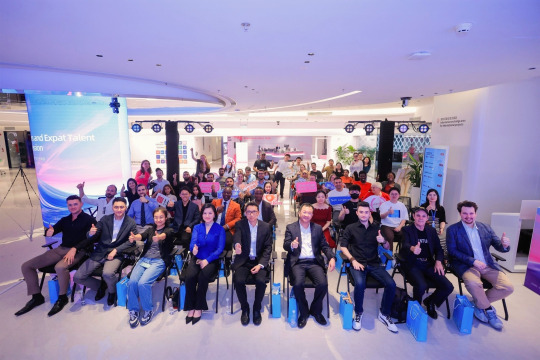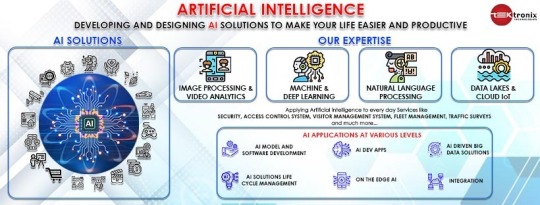#ai system integration alain
Text
Expedite IoT and BIM Technology Solutions for the Future UAE
Future with AI Solutions
In an era where technology is advancing at an unprecedented pace, artificial intelligence (AI) has emerged as a transformative force, reshaping industries and revolutionizing the way we live and work. AI solutions are no longer confined to science fiction; they have become an integral part of our daily lives, offering innovative solutions to complex problems. In this blog, we'll delve into the world of artificial intelligence solutions, exploring their diverse applications and the impact they are having across various sectors.
IoT Companies Abu Dhabi
#iotcompaniesuae #iotcompanies #iotsolutionsuae #iotcompaniesinalain #iotcompaniesinburdubai #iotcompaniesajman #iotcompaniesinuae #iotcompaniesinuae #iotcompaniesinalain #iotcompaniesinsharjah #aisolutions #aisolutionsabudhabi #aicompaniesinabudhabi #aisystemintegration #aicompanies #aicompaniessharjah
#ai companies abu dhabi#ai companies in sharjah#ai companies#ai solutions in abu dhabi#ai system integration#ai companies in bur dubai#ai system integartion abu dhabi#ai system integration bur dubai#ai companies in alain#ai system integration sharjah#ai system integration alain#ai companies in abu dhabi#iot companies in abu dhabi#iot solutions in bur dubai#iot solutions in ajman#iot companies in bur dubai#iot solutions in uae#iot solutions#iot#ai system#ai integration abu dhabi#ai integration bur dubai#ai system integration abu dhabi#ai solutions in bur dubai#ai solutions#iot technology solutions in uae#iot consulting solutions in uae#iot consulting solutions in bur dubai#iot consulting in bur dubai
0 notes
Text
We are one of the top Companies artificial intelligence companies in Dubai Abu Dhabi that provide businesses with an extensible customizable AI & IoT and data science solution that addresses the needs of a variety of use cases for enterprises Software.AI Integrations.
ai solutions abu dhabi
ai companies in uae
ai solution in alain
Top ai companies in abu dhabi
Top ai companies in uae
Top ai companies in alain
Top ai companies in ajman
#ai companies in uae#ai companies in bur dubai#ai solutions in abu dhabi#ai solutions in bur dubai#ai solutions in ajman#ai companies in abu dhabi#artificial intelligence solutions#ai companies#ai solutions in uae#ai solution in abu dhabi#artificial intelligence abu dhabi#ai companies in ajman#ai solution in bur dubai#ai companies in alain#ai system integrated in bur dubai#ai system integration alain#ai system integration in bur dubai#ai system integration abu dhabi#ai solution in saudi arabia#ai solution in alain#ai solution in bur dubai
0 notes
Text
Shenzhen Longhua Hosts Immersive Digital Technology Experience Event
Foreign Talents Appreciate the Charm of Longhua's Technology
“What digital smart services are available in Shenzhen Longhua?” “What are the eye-catching ‘black tech’ products from Longhua companies?” The answers to these questions were revealed during an immersive digital technology experience event. On March 31st, the event “Shenzhen Technology Stories · Foreign Talents Explore Smart Longhua” and the offline sharing session of the “Global Messenger · Shenzhen Stories Club” were held at the Longhua International Cooperation Center, attracting nearly 40 foreign talents and enthusiasts from the technology field.
The keywords “digitalization”, “technologization”, and “intelligentization” permeated the day's event and were the most direct impressions of Longhua for the foreign attendees. At the Longhua District Future City Exhibition Hall, through vivid digital charts, audiovisuals, and interactive installations, they gained an intuitive understanding of Longhua's historical roots, marveling at the tremendous transformation from a manufacturing town to a digital district.
Sava Tomoiaga, a Shenzhen entrepreneur since the 1990s, was amazed by the day-to-day changes in the Longhua District. She said, “New libraries and art galleries have been built here. I will bring my children to visit these places, looking forward to coming to Longhua again.”
Muhammad Hamza Younes, a PhD student at Shenzhen University, stated that he had never visited Longhua before, and today's visit left him with a profound impression of Longhua's technological and green development.
Louay Ali Dib (Luoyi) believes that the cost of living in the Longhua District is very reasonable. Living here, one can enjoy a high-quality life at a relatively low cost, experiencing convenience and comfort. In his view, this is the most unique charm of the Longhua District.
At the “Global Messenger · Shenzhen Stories Club” Longhua Showroom, located in the Longhua District International Cooperation Center, the five major industrial clusters of Longhua including low-altitude economy, digital economy, new energy, high-end medical equipment, semiconductors, and integrated circuits were showcased, dazzling the foreign tech enthusiasts present.
Humanoid robots capable of performing thousands of actions and tasks, a monitoring system capable of real-time monitoring of intercellular fluid glucose levels for 14 days, and photon transparent TVs that perfectly integrate virtual images with the real environment… These impressive black tech products from local enterprises in Longhua won widespread acclaim.
Additionally, the “Love Letters to Shenzhen” confession wall also attracted the attention of foreign friends. By scanning a QR code to leave messages, they wrote moving city love letters to Shenzhen in their mother tongues, expressing genuine emotions.
This event also marked the official launch of the “Global Messenger · Shenzhen Stories Club”. As a highlight of the journey to Longhua's technology, a unique technology story theme sharing session immersed all attendees in the endless charm of technology. Three foreign technology experts shared their stories of engaging in the tech field and their experiences closely related to technology.
Michael John Eagleton from Australia spoke on the theme of “The Application of Technology in Shenzhen”. Eagleton deeply interpreted Shenzhen's remarkable progress in fields such as 5G technology, artificial intelligence, the Internet of Things, and electric vehicles. He emphasized that Shenzhen not only has a deep culture of technological innovation but is also the first choice for global innovators and entrepreneurs, adding infinite vitality to the city's technological development.
Following him, Alain Garner shared on the theme of “Artificial Intelligence (AI)”. He suggested that the next important direction for AI is to transform it from complex textual content to genuinely human-centered design. His views sparked deep reflection among attendees on how artificial intelligence technology could better serve human society.
Finally, Louay Ali Dib (Luoyi) from Syria discussed the impact of artificial intelligence on humanity, sparking resonance among the audience.
The event concluded with the award ceremony for the “Most Active Messenger of 2023”, recognizing nine individuals who actively participated in international activities over the past year, conveying Shenzhen's stories and voice to the international community.
The “Shenzhen Global Messenger Plan” was initiated by EyeShenzhen in June last year. The plan aims to invite international individuals interested in Shenzhen's urban development, willing to actively participate in Shenzhen's international city construction, and possessing professional backgrounds and influential circles to serve as Shenzhen's global messengers. These messengers will share Shenzhen's city stories on international social media and various media platforms, spreading city observations and collectively building an international communication community with Shenzhen characteristics.
The event was hosted by the Publicity Department of the CPC Shenzhen Municipal Committee, the Office of the Foreign Affairs Working Committee of the CPC Shenzhen Municipal Committee (Shenzhen Municipal People's Government Foreign Affairs Office), and the People's Government of Longhua District, Shenzhen. It was undertaken by the Longhua District International Cooperation Center and EyeShenzhen of the Shenzhen Media Group.

0 notes
Text
How AI will help keep time at the Tokyo Olympics
How AI will help keep time at the Tokyo Olympics
https://theministerofcapitalism.com/blog/how-ai-will-help-keep-time-at-the-tokyo-olympics/

“In volleyball, we are now using cameras with computer vision technologies to track not only athletes, but also the ball,” says Alain Zobrist, head of Omega Timing. “So it’s a combination in which we use camera technology and artificial intelligence to do that.”
According to Zobrist, Omega Timing’s R&D department consists of 180 engineers and the development process began with positioning systems and motion sensor systems, according to Zobrist, in 2012. The goal was to reach a point in which, for multiple sports to 500 more Sports Events in which it operates each year, Omega could provide detailed live data on athletes ’performance. This data should also take less than a tenth of a second to be measured, processed, and transmitted during events, so that the information matches what viewers see on the screen.
With beach volleyball, this meant taking this positioning and movement technology and training an AI to recognize a myriad of types of shots, from breaks to blocks to spikes and variations of the same, and passing types, as well as the flight path of the ball, to then combine this data with information collected from the sensors of the gyroscope of the players’ clothes. These motion sensors allow the system to know the direction of movement of the athletes, as well as the height of the jumps, the speed, etc. Once processed, all this is broadcast live to broadcasters for use in comments or on-screen graphics.
According to Zobrist, one of the hardest lessons for AI to learn was to accurately track the ball in play when the cameras could no longer see it. “Sometimes, it is covered by the body part of an athlete. Sometimes it’s out of the realm of television, ”he says. “So the challenge was to keep track of the ball when you’ve lost it. To make the software predict where the ball is going, and then when it reappears, recalculate the space from when you lost the object and recovered it, and fill in the [missing] data and continue automatically. That was one of the big problems. “
This ball tracking is crucial for the AI to determine what happens during the game. “When you can track the ball, you will know where it was and when it changed direction. And with the combination of the athletes’ sensors, the algorithm will recognize the shot, “says Zobrist.” Whether it was a block or a puzzle. You’ll know which team and which player it was. So it’s that combination of ‘both technologies which allows us to be accurate in measuring data’.
Omega Timing claims that its beach volleyball system is 99% accurate, thanks to sensors and various cameras that run at 250 frames per second. However, Toby Breckon, a professor of computer vision and image processing at the University of Durham, is interested to see if this is maintained during the Games and, above all, if the system is fooled by racial and gender differences.
“What has been done is reasonably impressive. And you’ll need a big data set to form an AI in every move, “says Breckon.” But one of the things is accuracy. How often do you get it wrong in terms of these different moves? How often do you lose track? And also if it works evenly in all races and genders.It is 99 percent accuracy of, say, the U.S. women’s team i 99% accuracy in the Ghana women’s team? ”
Zobrist is confident and explains that while it may have been easier to call on Google or IBM to provide the necessary AI experience, this was not an option for Omega. “What’s extremely important, whether it’s for a scoring sport or a timing sport, is that we can’t have discrepancies between the explanation of performance and the end result,” he says. “To protect the integrity of the result, we cannot trust another company. We must have the necessary experience to be able to explain the result and how the athletes came about.”
As for future sync and tracking updates, Zobrist is narrow, but says the 2024 Paris Games will be key. “You will see a completely new set of innovations. Of course, it will stay around timing, scoring, and certainly also around motion sensors and positioning systems. And, of course, also in Los Angeles in 2028. We have some really interesting projects that we have really just started ”.
Bigger cable stories
Source link
0 notes
Text
Evolution of Fleet Management Systems
A few decades back, no one could have imagined a mechanism that can offer real-time monitoring of vehicles. It seemed to be a farfetched idea until GPS trackers came along. The GPS tracking revolutionized the operations of various fleet businesses including logistics, supply chain and delivery etc. and their productivity skyrocketed.

When the conventional mechanism proved to be insufficient for the growing demands of the market, an innovative mechanism was introduced called Fleet Management System. This technology provided a GPS tracking software where all operations of fleet-related businesses can be managed and monitored.
The businesses welcomed this innovative system with open arms as it offered them both convenience and efficiency. With time, new advancements have been made to the technology to meet the changing market requirements, and this blog will cater to them.
The History of Fleet Management Systems:
Concept of fleet management has been around for over fifty years now. The businesses used to employ conventional technologies like relying on fleet managers to perform all the tasks back in the day. Let us have a detailed look at the embryonic stages of the fleet telematics technology.
Inception:
The idea of managing fleets was conceived by the U.S. automobile industry before the invention of GPS back in 1974. It employed the basic functionalities of fleet telematics like order processing, status reporting, and automated communication etc. The mega automobile manufacturers like Ford, General Motors and Chrysler made use of the electronically processed management mechanism for their fleets. At that time, mainframe computers were used to manage fleet operations.
In the latter half of the 1970s, the concept of telematics was introduced to the world. Alain Minc and Simon Nora of France defined it using telecommunications to transfer information. After this groundbreaking discovery, more research was conducted to ensure that this technology is made eco-friendly and viable for businesses.
Introduction of GPS:
In 1978, an experimental satellite Block-I GPS manufactured by Rockwell International was sent into space. Following the footsteps of this launch, another ten Block-I satellites were sent into space in 1985 to enhance the validity of GPS technology. As the number of satellites orbiting the earth increased, the probability of GPS tracking becoming functional also rose. Finally, on Jan 17 1994, a total of 24 satellites were launched in space, making the GPS technology fully operational.
Post Fully Functional GPS Technology:
The invention of GPS Technology brought a revolution in the scope of fleet telematics with infinite possibilities ahead. It not only changed the method of leading organizations to manage their fleet but also provided researchers with a defining stepping stone to produce clutter-breaking ideas.
Addition of New Features:
Once GPS technology became functional, many other features were also included in the telematics systems to enhance their efficiency. For example, staff performance management and weather forecast systems were integrated with the fleet telematics technology in a few years after GPS was made functional.
One of the most significant benefits of GPS technology was accuracy which became better with time. With the use of GPS, businesses can strictly monitor every vehicle in their fleet resulting in more efficiency and productivity.
Automation:
Post GPS vehicle tracking, the main emphasis of research has been on making the mechanism more seamless. The integration of different apps and systems with a centralized telematics system allowed businesses to get better automation during daily operations. Various features like fleet maintenance, notification alerts and reporting were introduced to broaden the scope of the telematics system and make it potentially viable for businesses.
Geofencing:
Geo-fencing is a revolutionary technique introduced using GPS technology as its basis. It has served the purpose of businesses around the world in many ways by strengthening security, preventing route deviation, enhancing productivity etc. With geofencing, companies can strictly monitor the activity of every vehicle in their fleet and take quick measures in case of an emergency.
Future Potential:
The fleet telematics is a booming industry with constant induction of new functionalities in the technology. Limitless possibilities are lying ahead for the researchers and innovators related to this field.
Induction of AR (Augmented Reality) Technology:
When AR first appeared to the scene, everyone was amazed by it. It provided a more optimized and refined appearance of reality to the viewers. Keeping its visual benefits in mind, the fleet telematics industry is looking to use it to improve the safety of the drivers. The modern research shows prospects of AR’s assistance in identifying the presence of obstacles in the path while driving.
The idea of using the windshield as a screen to detect hurdles is in the pipeline, whereas AR’s integration with a telematics system is also probable. The goal is to assist the drivers in the best possible way by using AR technology.
Self-Driving Vehicles:
The concept of self-drive is not new anymore as it is under process from quite some time now. Many giant car producers have worked on this technology and provided some features that fall under this category. However, the goal of achieving a fully autonomous vehicle is on the cards and soon to be achieved.
Once autonomous vehicles are designed, the telematics systems will be reshaped. The self-driving vehicles will open up many possibilities for AI(Artificial intelligence) that can add to the efficiency and interactivity of the telematics systems.
Keeping the start of fleet management in view, it is evident that this technology has come a long way. Despite all the advancements, still, there is a lot of room for improvement and innovation. The research and development process of the telematics seems to be on the right track to becoming more efficient and convenient.
0 notes
Text
Microsoft Accelerator Shanghai Jump Starts the Evolution of 14 Startups, The Total Valuation tripled to RMB 6.6 billion in 4 months
China becomes the only country where Microsoft has two accelerators
SHANGHAI, June 23, 2017 /PRNewswire/ -- Being an entrepreneur is not easy. It requires vast knowledge, drive, agility, strong conviction and a passion that burns inside and pushes you forward. For Microsoft, the most effective way to empower entrepreneurs around the world on their journey to build great companies is through incubation. With its global Microsoft Accelerator program, Microsoft works with later-stage startups to provide the tools, resources, connections, knowledge and expertise they need to become successful companies, backed by the immense computing power of Microsoft Azure.
Microsoft Accelerator Shanghai tripled startups value to $1bn in 4 months
The latest accelerator from Microsoft is Microsoft Accelerator Shanghai (MASH), which launched in January 2017. MASH hosted its first batch's graduation and demo day on June 22, showcasing 14 startups. Since joining MASH 4 months ago, the total valuation of the 14 startups has tripled. 10 out of the 14 startups have received new rounds of funding for a total of 6.6 billion RMB, and one startup has gone public. All startups have adopted Microsoft Azure for public cloud services. During incubation period, MASH delivered more than 200 hours of training and made more than 500 customer and VC connections for the startups.
"The digital transformation of China's economy presents a huge opportunity for both big companies and startups across all industries," said Alain Crozier, Microsoft Corporate Vice President and Chairman and CEO of Greater China Region. "Microsoft Azure has supported the digital transformation of China since landing in China three years ago. With Microsoft Accelerator China, the company has nourished a thriving local ecosystem of startups to further transform China's digital landscape. MASH will further empower innovators on this journey."
Microsoft Accelerator China was founded in 2012 and has built up close relationship with more than 300 investment firms to bridge startups with top venture capitalists. The accelerator strategically teams up with industry leading companies to connect startups with potential long-term clients.
Now, Microsoft's accelerators in Beijing and Shanghai boast a combined 170 graduates, whose products and services reach 500 million individual users and more than 2 million enterprise accounts. More than 93% of alumni have raised next rounds of funding.
As of today, the total market valuation for Microsoft Accelerator China alumni has reached RMB 56.6 billion, which, post-incubation, grew by more than 600%. This success hasn't gone unnoticed; Microsoft Accelerator has been named "The Best Accelerator/Incubator in China" for five years straight by ChinaVenture Group, China's leading venture capital and private equity data service company.
During MASH's first demo day, the first batch graduates shared their strong cloud, artificial intelligence and big data capabilities:
SchoolPal Online is a startup using Microsoft .Net technology to develop their backend systems that support hyper-scale concurrency and secure data storage. Over 80 thousand schools in China are relying on SchoolPal's SaaS service every day.
Caicloud has released TensorFlow, a Service on Azure, which greatly reduces the effort and cost that an enterprise would have to spend to create a Deep Learning infrastructure. This service stands as a testimony to Microsoft's commitment to building an open ecosystem and democratizing AI.
MINIEYE is building its cutting-edge computer vision technology for autonomous driving on the Microsoft Azure platform, leveraging its hyper-scale intelligent cloud computing capabilities.
Kyligence is the Shanghai based company leading Apache Kylin, an Apache, top level open source project focusing on providing high performance business intelligence analytics solutions on top of Hadoop big data. Kyligence has integrated their solution seamlessly with Azure HDInsight and has made it conveniently available to users via the Microsoft Azure Marketplace.
EasyRetailPro leverages the rich capabilities that Microsoft Azure offers on big data and artificial intelligence offer a social CRM solution for retail customers. With the help of Microsoft Azure, EasyRetailPro has seen significant progress on their capabilities for retail big data analysis, helping retail chains get deep insight on their customers based on transaction data, social media engagements, and more.
Lavector's Brand Vision provides an AI-powered, real-time interactive digital marketing SaaS solution. Deeply integrated with Microsoft Azure's AI services and features, Lavector's transparent, intelligent, and agile digital marketing interface drives highly efficient interactions between customers and brands.
MASH launched with full, direct support from the Shanghai Xuhui District government, who has set itself a strategy of "Innovation Drives Development" in an effort to build more hubs of innovation, particularly in the Caohejing Hi-Tech Park. MASH was also made possible through a cooperation with INESA, a regional partner for ecosystem development. As a large state-owned enterprise group, INESA is comprised of 22 wholly-owned subsidiary companies, over 80 subsidiary companies with controlling shares, and 37 subsidiary companies with joint shares, across the globe. Committed as a total solution provider and operator for smart cities, INESA works with MASH to help technology startups achieve better growth with its large client base.
"In order to support a strategy of turning Shanghai into an international center for technology innovation, Xuhui is developing its technology service sector accordingly, especially with help from global incubators and accelerators within our District," said Mrs. Chen Shiyan, Vice Mayor of Xuhui District Government. "Microsoft Accelerator Shanghai has been made possible through a joint effort by the Xuhui government, Microsoft and INESA, integrating vast resources to support better growth for startups in Shanghai."
Elton Huang, PwC China Shanghai Senior Partner and James Chou, Managing Director and CEO in Residence of MASH announced a joint program called the Microsoft Accelerator Shanghai FinTech Camp Powered by PwC. The new program will focus on later-stage funded fintech startups, helping them to quickly accelerate and become enterprise-ready companies. PwC China will offer mentorship and customer access to its financial industry clients to the startups. Selected startups will also be able to use the co-working space in PwC's China Innovation Center in Shanghai.
"This is the first accelerator program resulting from a cooperation between PwC China and Microsoft Accelerator Shanghai," said Elton Huang. "By leveraging available resources from both companies, we hope to break barriers between large finance service companies and startups and push more tech innovations from ideas to end products."
"China is the only country where Microsoft has two accelerators," said James Chou. "With support from the Shanghai government, MASH will play an important role in Shanghai's digital transformation. Furthermore, the Microsoft Accelerator Shanghai FinTech Camp Powered by PwC program will empower entrepreneurs to create more innovative FinTech solutions, helping Shanghai on its journey to becoming one of the world's leading financial centers."
The Microsoft Cloud Incubation Program is another initiative by Microsoft China. It is an innovation incubation program targeting newly-founded cloud and mobile services startups in China. Microsoft Accelerator and the Microsoft Cloud Incubation program form an "innovation pyramid" in China. Through the Microsoft Cloud Incubation program launched in 2015, Microsoft, government, and selected partners work together to establish incubation centers across China serving startups who focus on innovation in cloud computing, IoT, big data, machine learning, AI, and mixed reality. With Microsoft Accelerator targeting at later stage startups, Microsoft now has a complete coverage of technology startup's lifecycle in China.
To view the original version on PR Newswire, visit:http://ift.tt/2t06plv
Read this news on PR Newswire Asia website: Microsoft Accelerator Shanghai Jump Starts the Evolution of 14 Startups, The Total Valuation tripled to RMB 6.6 billion in 4 months
0 notes
Photo

New Post has been published on http://edgysocial.com/weekend-roundup-u-s-founders-entrusted-elites-to-save-democracy-from-itself/
Weekend Roundup: U.S. Founders Entrusted Elites To Save Democracy From Itself
The word “democracy” does not appear in the U.S. Constitution. Nor in the Bill of Rights or the Declaration of Independence. That is because, as most Americans today would likely be surprised to discover, America’s Founding Fathers not only distrusted democracy but, based on their close reading of Greek and Roman history, were actually hostile to the notion that it was the best system for governing society.
James Madison, the fourth U.S. president and a key author of the Federalist Papers, famously declared: “Democracy is the most vile form of government … democracies have ever been spectacles of turbulence and contention; have ever been found incompatible with personal security or the rights of property; and have in general been as short in their lives as they have been violent in their deaths.” John Adams, the second American president, wrote: “Democracy never lasts long. It soon wastes, exhausts and murders itself. There never was a democracy yet that did not commit suicide.”
Taking into account this central lesson of antiquity, the founders instead designed a mixed constitutional republic that, while rooted in consent of the governed, delegated authority to elites ― representative, indirectly elected and appointed bodies ― that could “refine and enlarge the public views” as ballast against the popular passions of prejudice and the narrow horizons of self-interested constituencies.
For the founders, popular sovereignty unchecked by the cool and reasoned deliberation of the meritorious few would invite majoritarian intolerance of individual and minority rights, degenerate into mob rule and summon tyranny to restore order. “No political truth is certainly of greater intrinsic value,” Madison wrote in The Federalist Papers No. 47.
In an interview with The WorldPost this week, political scientist Francis Fukuyama addresses the conundrum presented to the founders’ idea of governance in the face of 21st century populism. “Populism exists,” he says, “because institutions are elite-driven.” While “institutions in the past have always been controlled by the elites,” he continues, “through the presence of the internet they are losing their power. Maybe democracies don’t work too well without a certain degree of control from elites.”
I would add that the great danger today is conflation by fervent populists of corrupt, out-of-touch and unresponsive elites ― that rightly should be overthrown ― with a learned and experienced elite that any large society needs to govern. As a governing ethos, know-nothingness will get you nowhere.
Yet, as Pankaj Mishra observes in another WorldPost interview, the very foundation upon which elites might rehabilitate their authority has eroded. The Indian author takes the debate to both a deeper and a more global level by examining how the ressentiment against the cosmopolitan caste that has been gestating in the developing world for decades has now erupted in a mutiny against the governing narrative in “the heart of the modern West.” If the Western “truths” that have dominated the world in modern times at the expense of alternative worldviews are now themselves unraveling, where do we go next?
“We are now recognizing that our modern civilization has always been incredibly fragile,” Mishra says, “since it has no recourse to any transcendental truth, as distinct from certain agreed-upon truths. And so while political and economic crises may come and go ― Trump’s presidency may implode tomorrow ― the moral and epistemological breakdown we witness today is more enduring and destructive. I would argue that the naïve people, the free-marketeers and globalizers, responsible for this state of affairs did not know what they were doing ― that they were dismantling a whole system of interlocking and necessary fictions that societies and individuals have needed since the death of God to give a degree of meaning, purpose and stability to their lives.”
The consequence, Mishra argues, is the universalization of nihilism in which the whole notion of “consensual truth” is collapsing. “Nihilism today is the single greatest threat to the modern world since its founding principles of reason, science and progress were formulated,” he concludes. It is not surprising, then, in his view, that “the subjectivization of ‘facts’” and the “fragmentation of ‘truth’” are filling up the vacuum. They are the remainder of the West’s heyday.
Nowhere is the truth these days more malleable than in Russia. Writing from Moscow, Ilya Yashin marks the second anniversary this week of the assassination of his friend and opposition leader, Boris Nemstov. Yashin sees a dangerous campaign to revise recent history and roll back post-Soviet advances in the media and the rule of law in the nationalist revival under Russian President Vladimir Putin. Nick Robins-Early reports that Russian disinformation efforts have a lopsided advantage over Europeans trying to defend the integrity of their discourse as elections loom. He also highlights a speech by Hungarian Prime Minister Viktor Orban this week in which the leader expressed a new angle on nativism ― that “’ethnic homogeneity’ is key for economic success, and that ‘too much mixing causes problems.’”
In a wide-ranging essay, Nicolas Berggruen examines the role of opposition movements. While raucous protests in and of themselves may make a point, he says, they also can create a sense of chaos that “is the greatest gift to parties in power, especially dictators.” Social movements that succeed, by contrast, are characterized by a broadly shared narrative, a plan, organization and leadership, Berggruen argues.
This week the Berggruen Institute also hosted a discussion in Los Angeles with Sapiens and Homo Deus author Yuval Harari. The Israeli historian discussed what it means to be human in an era when we are attaining the power of gods to change our own species and create a new one ― AI. “History began when humans invented gods, and will end when humans become gods,” he says.
Former WorldPost China Correspondent Matt Sheehan looks outside the box on the troubled relations between Washington and Beijing. “The engine room of the U.S.-China relationship,” he writes, “has moved from the White House to City Hall.” While the talk in Washington is of tariffs, American mayors are wooing Chinese investors and immigrants for their local projects.
Writing from Shanghai, Zhang Weiwei argues that political legitimacy comes fundamentally from the competence of leadership, as in the case of the Chinese Communist Party, that fulfills its contract with the people by delivering prosperity and security ― whether they were elected or not.
Eric Olander and Cobus van Staden see a Trump-inspired shift to China coming to Africa as the continent looks to Beijing for stability in the absence of a clear American Africa policy.
Finally, our Singularity series this week asks a question about our pets that we may soon be asking about our children: should we genetically engineer dogs to make them healthier?
youtube
WHO WE ARE
EDITORS: Nathan Gardels, Co-Founder and Executive Advisor to the Berggruen Institute, is the Editor-in-Chief of The WorldPost. Kathleen Miles is the Executive Editor of The WorldPost. Farah Mohamed is the Managing Editor of The WorldPost. Alex Gardels and Peter Mellgard are the Associate Editors of The WorldPost. Suzanne Gaber is the Editorial Assistant of The WorldPost. Katie Nelson is News Director at The Huffington Post, overseeing The WorldPost and HuffPost’s news coverage. Nick Robins-Early and Jesselyn Cook are World Reporters. Rowaida Abdelaziz is World Social Media Editor.
EDITORIAL BOARD: Nicolas Berggruen, Nathan Gardels, Arianna Huffington, Eric Schmidt (Google Inc.), Pierre Omidyar (First Look Media), Juan Luis Cebrian (El Pais/PRISA), Walter Isaacson (Aspen Institute/TIME-CNN), John Elkann (Corriere della Sera, La Stampa), Wadah Khanfar (Al Jazeera) and Yoichi Funabashi (Asahi Shimbun).
VICE PRESIDENT OF OPERATIONS: Dawn Nakagawa.
CONTRIBUTING EDITORS: Moises Naim (former editor of Foreign Policy), Nayan Chanda (Yale/Global; Far Eastern Economic Review) and Katherine Keating (One-On-One). Sergio Munoz Bata and Parag Khanna are Contributing Editors-At-Large.
The Asia Society and its ChinaFile, edited by Orville Schell, is our primary partner on Asia coverage. Eric X. Li and the Chunqiu Institute/Fudan University in Shanghai and Guancha.cn also provide first person voices from China. We also draw on the content of China Digital Times. Seung-yoon Lee is The WorldPost link in South Korea.
Jared Cohen of Google Ideas provides regular commentary from young thinkers, leaders and activists around the globe. Bruce Mau provides regular columns from MassiveChangeNetwork.com on the “whole mind” way of thinking. Patrick Soon-Shiong is Contributing Editor for Health and Medicine.
ADVISORY COUNCIL: Members of the Berggruen Institute’s 21st Century Council and Council for the Future of Europe serve as theAdvisory Council — as well as regular contributors — to the site. These include, Jacques Attali, Shaukat Aziz, Gordon Brown, Fernando Henrique Cardoso, Juan Luis Cebrian, Jack Dorsey, Mohamed El-Erian, Francis Fukuyama, Felipe Gonzalez, John Gray, Reid Hoffman, Fred Hu, Mo Ibrahim, Alexei Kudrin, Pascal Lamy, Kishore Mahbubani, Alain Minc, Dambisa Moyo, Laura Tyson, Elon Musk, Pierre Omidyar, Raghuram Rajan, Nouriel Roubini, Nicolas Sarkozy, Eric Schmidt, Gerhard Schroeder, Peter Schwartz, Amartya Sen, Jeff Skoll, Michael Spence, Joe Stiglitz, Larry Summers, Wu Jianmin, George Yeo, Fareed Zakaria, Ernesto Zedillo, Ahmed Zewail and Zheng Bijian.
From the Europe group, these include: Marek Belka, Tony Blair, Jacques Delors, Niall Ferguson, Anthony Giddens, Otmar Issing, Mario Monti, Robert Mundell, Peter Sutherland and Guy Verhofstadt.
MISSION STATEMENT
The WorldPost is a global media bridge that seeks to connect the world and connect the dots. Gathering together top editors and first person contributors from all corners of the planet, we aspire to be the one publication where the whole world meets.
We not only deliver breaking news from the best sources with original reportage on the ground and user-generated content; we bring the best minds and most authoritative as well as fresh and new voices together to make sense of events from a global perspective looking around, not a national perspective looking out.
— This feed and its contents are the property of The Huffington Post, and use is subject to our terms. It may be used for personal consumption, but may not be distributed on a website.
Business – The Huffington Post
0 notes
Text

#ai companies in uae#ai companies in abu dhabi#ai companies in sharjah#ai companies in alain#ai companies bur dubai#ai solutions in abu dhabi#ai solutions in bur dubai#ai solutions in sharjah#ai companies in ajman#ai technology solutions in bur dubai#ai system integrated abu dhabi#iot companies in abu dhabi#iot tracking systems in abu dhabi#iot tracking systems in alain#iot tracking systems in bur dubai#iot companies in alain#iot companies in bur dubai#iot companies in ajman#smart iot tracking system abu dhabi#smart iot tracking systems in bur dubai#smart iot tracking systems in ajman
0 notes
Text
youtube

Tektronix Technology: Pioneering the Future with AI Solutions
In an era where technology is advancing at an unprecedented pace, artificial intelligence (AI) has emerged as a transformative force, reshaping industries and revolutionizing the way we live and work. AI solutions are no longer confined to science fiction; they have become an integral part of our daily lives, offering innovative solutions to complex problems. In this blog, we'll delve into the world of artificial intelligence solutions, exploring their diverse applications and the impact they are having across various sectors.
The Power of AI Solutions
Artificial intelligence is more than just a buzzword; it's a game-changer. With its ability to process vast amounts of data, learn from patterns, and make informed decisions, AI solutions are driving advancements across domains.
#iotcompaniesuae #iotcompaniesabudhabi #iottracking #iottrackingsystemabudhabi #iottrackingabudhabi
#iottrackingsolutionsinburdubai
#iottrackingsystemuae #iottrackingsysteminuae #iotsolutionsabudhabi #iottrackingsystems
#iottrackingsystemuae #iottrackingsystemabudhabi #iotsolutionsabudhabi #iottrackingsystem #iottrackingsytsemabudhabi
iot companies uae
iot solutions abu dhabi
iot companies dubai
iot companies sharjah
iot companies in alain
iot solution in saudi arabia
iot solutions in bur dubai
IoT Solutions in UAE
IoT Solutions in Abu Dhabi
#iot companies in abu dhabi#iot companies in alain#iot companies in sharjah#iot companies#iot tracking system abu dhabi#iot technology companies in uae#iot technology companies bur dubai#iot technology companies in ajman#iot technology companies in sharjah#iot system integration abu dhabi#iot companies bur dubai#iot companies sharjah#iot Companies in alain#iot technology abu dhabi#iot technology system abu dhabi#iot companies in bur dubai#ai companies in abu dhabi#ai companies in bur dubai#ai system integration abu dhabi#iotcompaniesuae#iotsolutionsinabudhabi#iot companies in ajman#IoT Software Solutions#IoT Software Solutions dubai#IoT Software Solutions abu dhabi#IoT Software Solutions in uae#IoT Software Solutions in ajman#Youtube
0 notes
Text
Tektronix Technology: Pioneering the Future with AI Solutions
In an era where technology is advancing at an unprecedented pace, artificial intelligence (AI) has emerged as a transformative force, reshaping industries and revolutionizing the way we live and work. AI solutions are no longer confined to science fiction; they have become an integral part of our daily lives, offering innovative solutions to complex problems. In this blog, we'll delve into the world of artificial intelligence solutions, exploring their diverse applications and the impact they are having across various sectors.
The Power of AI Solutions
Artificial intelligence is more than just a buzzword; it's a game-changer. With its ability to process vast amounts of data, learn from patterns, and make informed decisions, AI solutions are driving advancements across domains.
#aisolutions #aisolutionuae #aisolutionsabudhabi #ArtificialIntelligencecompaniesinDubai #aisolutionsaudi #aicompaniesuae #aicompaniesabudhabi #aicompaniesabudhabi
#topaisolutionsuae #topaicompaniesinajman
#ai companies uae#ai solutions in abu dhabi#ai companies in ajman#ai solutions in bur dubai#ai solutions in alain#ai companies in bur dubai#ai system integration abu dhabi#ai software development abu dhabi#ai software development in ajman#ai software development in sharjah#ai software development in bur dubai#ai companies saudi arabia#ai technology solutions in abu dhabi#artificial intelligence solutions dubai#artificial intelligence solutions abu dhabi#artificial intelligence solutions in sharjah#artificial intelligence solutions in bur dubai#artificial intelligence for healthcare#ai company uae
0 notes
Link
access control system with facial recognition
access control system face recognition Abu Dhabi
access control system Dubai
access control system Abu Dhabi
access control system in Sharjah
biometric access control system uae
biometric access control system abu dhabi
biometric access control system in ajman
biometric access control system in bur dubai
Tektronix Technology customers can count on the best customer support and advice from Tektronix Technology Systems team for the latest technologies in biometric access control systems. Tektronix Technology offers a comprehensive range of products that are specifically designed to monitor your home or business premises, offering advanced security solutions. Tektronix Technology also provides wide range of terminals from products that can provide the most challenging security solutions. Tektronix Technology offers a comprehensive range of products for businesses, providing access control system products, terminals and other advanced security solutions.
#access control system abu dhabi#access control in uae#access control system in bur dubai#access control systems in sharjah#access control system in ajman#access control system in saudi arabia#access control system with facial recognition uae#access control system with facial recognition abu dhabi#access control system with ai integration#access control system with ai integration uae#access control systems uae#access control systems sharjah#biometric access control system#biometric access control system uae#biometric access control system abu dhabi#biometric access control system in uae#biometric access control system in ajman#biometric access control system in alain#biometric access control system oman#biometric access control system qator#biometric access control systems#biometric access control systems in uae#best biometric access control systems uae#best biometric access control systems in ajman#best biometric access control system bur dubai#best biometric access control system alain
0 notes
Video
youtube

Tektronix, technologies brings its highly informed expertise in IoT (Internet of Things) and Artificial Intelligence (Ai) to the world. Tektronix technologies has engineered the best in its class IoT solutions and Ai solutions. Tektronix technologies can boast about being one of the best IoT Solutions and Ai solutions provider in Dubai, Abu Dhabi and All over the UAE IoT Companies Dubai , IoT Companies Abu Dhabi
ai companies in abu dhabi , ai companies in uae , ai companie in dubai , iot companies in abu dhabi , iot solutions in uae , iot companies in ajman , iot companies in bur dubai , iot tracking solutions in abu dhabi , iot tracking system in bur dubai , iot tracking in uae , iot companies in sharjah , iot companies in alain , internet of things , iot companies , iot integration in uae
#iot companies in abu dhabi#iot companies in sharjah#iot companies in bur dubai#iot companies in alain#iot sansors#iot tracking solutions in uae#iot tracking solutions in bur dubai#iot companies in usa#iot companies saudi arabia#smart iot solutions in abu dhabi#smart iot solutions in uae#smart iot tracking solutions in uae#smart iot companies in bur dubai#ai companies in abu dhabi#ai companies in bur dubai#ai companies in sahrjah
0 notes